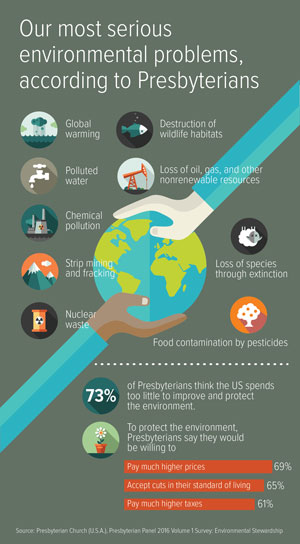Go Figure
Presbyterians and the Environment
by Angie Andriot
God has given humans a responsibility to care for the earth. About 98 percent of Presbyterians agree with this statement, according to a recent study by PC(USA) Research Services. In addition, 90 percent feel that environmental issues are appropriate social concerns for the church.
But are we as a denomination doing enough? The resounding answer is no: 71 percent of Presbyterians believe that the Presbyterian Church (U.S.A.) should become more involved in environmental issues. Climate change tops the list, with 73 percent of Presbyterians agreeing this is one of the most serious environmental issues we face today.
The good news is that Presbyterians are already doing much to enact their God-given responsibility to care for the earth. In the past year, about 97 percent have recycled, 92 percent have moderated their thermostat to conserve energy, 42 percent have composted food waste, and 61 percent have carpooled.
Congregations are protecting the environment, as well: in the past year 91 percent have shared news electronically, 81 percent have recycled their church bulletins, 67 percent have encouraged monitoring the thermostat, and 62 percent have used biodegradable, compostable, or reusable dinnerware.
However, there is room for improvement: only 34 percent of Presbyterians have heard a sermon during worship that emphasized environmental issues, and just 28 percent of congregations have had an educational event or study group about environmental issues.
Angie Andriot is a research associate with Research Services for the Presbyterian Mission Agency.



